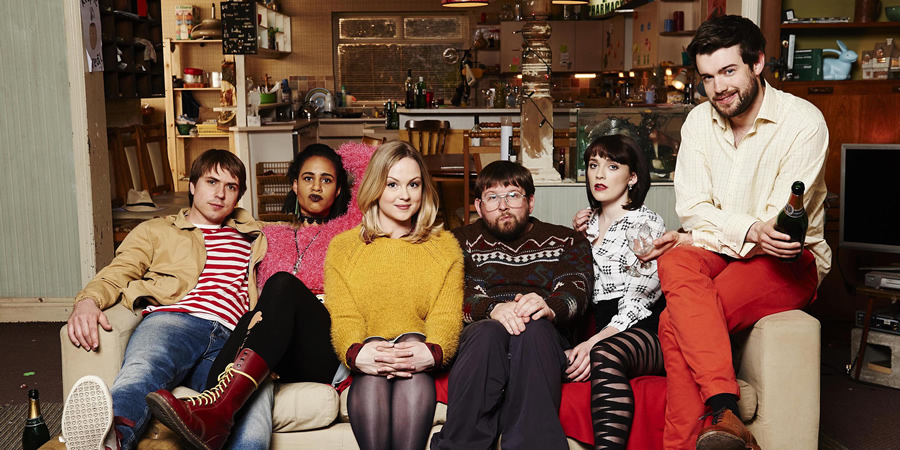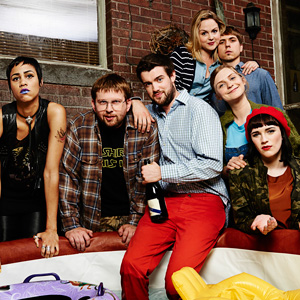Sam Bain interview


Sam Bain is one half of the writing team Bain & Armstrong. Responsible for Channel 4 hit sitcom Peep Show, they're also the creators and lead writers of Fresh Meat. In this interview, Sam discusses the creative process behind the show, and his own uni days.
Fresh Meat is back, and the gang have moved into their second year at University. Can we expect them to have grown up at all?
No. If anything the reverse. One of the pitches is that we've got a new housemate replacing the absent Josie, who's in Southampton as we start the series. So we've got Candice, who's a first year Fresher, and they - and particularly Oregon - treat her like she's about ten years younger than them, and they know it all, and have seen things she couldn't possibly imagine. They treat her with that kind of attitude. In their minds, they've moved on, but in reality they haven't.
You write the show as part of a team. Why did you decide to do that when you and Jesse already had so much success writing as a pair?
It was a mixture. It was partly practical, because we had an outstanding commission for Peep Show Series 8. We just wouldn't have been able to write them all ourselves, it would have been unmanageable. But we've also always really believed in team-writing. We'd done it before, earlier in our careers. It's fun to get together and come up with some comedy ideas. It's the way all American comedies are written and there are a lot of advantages to it. It's great to have other voices. And it's a great way of breaking in new talent who may not have written for TV before, and also to work with some really experienced talent like Tony Roche.
How does the dynamic work? Does everyone write their own episode, or do they become the voice for each specific character, or do you all just sit around a table shouting at each other?
There is some shouting - although usually fun shouting rather than aggressive shouting. We meet up at the beginning and do a week or two of group brainstorming, where we come up with the ideas that will fuel the series, and then we break up into two groups, splitting the series into block one and block two, and we'll sit around and figure out storylines together for those episodes, and then the writers go off and write the first drafts on their own. And then we obviously review them, make notes, do more drafts, lots of read-throughs and that sort of thing.
You and Jesse met as students in Manchester. How do you think being a student then compares to being one now?
I have no idea, because I'm not a student now. But we're guessing that it's exactly the same. That's the premise upon which the show is based. Obviously there are some differences we touch upon a little bit, about student hardship and stuff - but on the whole, we just hope that the experience is universal, and even if you went to University in the 1950s you might still relate to it. Obviously the emotions and the characters are the feature of the show, it's not so much about contemporary issues as about these characters. And I think the experience of going away from home for the first time, living in these weird, unfamiliar places with these weird, unfamiliar people, hopefully that's pretty universal.
What were the best and worst aspects of University life for you?
Well, the best aspects were all the amazing friends I made and people I met, and I'm still in touch with - obviously Jesse being the obvious example. And it was there that I started doing writing - I did a creative writing course, and if I hadn't done that I probably would never have started writing, so that changed my life in quite a dramatic way. And it does give you an airlock in your life somewhere you can grow and change outside of the pressures of work and mortgages and family and stuff. I think there's lots of plusses. The minuses are it can be quite a lonely experience, it's not always that easy to adjust to this whole new life, new city and new group of friends. Sometimes it can be a bit hard. But overall it's a really positive thing - at least it was for me.
Did you know people like JP and Howard? Or, God forbid, were you people like that?
I suppose they are based sometimes on people we were or people we knew a little bit. I think probably Jesse and I would identify more with the slightly more normal characters like Kingsley and Oregon than your Howards or your JPs or Vods. Jesse talks about how he grew up in Oswestry in Shropshire, and he never met any JPs, whereas I went to public school in London and had them in my life on a regular basis. So we have good, different perspectives on that, which is helpful. But I don't think I'd identify that much with any of the characters. I think there were some people we met who we filed away in our mental database, and were maybe inspired by to write some of the characters, for sure. And others are just made up. That's the great thing about writing - you don't have to be that faithful to life, you can just think 'Wouldn't it be funny if Vod existed?'

Vod and Oregon have been off travelling in South America during the summer. Did you go travelling to find yourself in your summers, or did you work in the local garage?
In my first summer I went to work in New York for three months with my girlfriend. That was my most memorable summer. The most memorable thing about it was I went over there with my girlfriend and came back single. In my year off I went and taught in Africa. Apart from that, I worked at Wimbledon mostly. I lived in south-west London, I was a court-coverer - you know the guys who pull the covers over when it's raining? That was me, for at least two or three summers.
You and Jesse shared a student house. Did you have any bad habits, or were you good people to share with?
I certainly didn't have any bad habits, that's for sure! I don't think Jesse did either. I didn't go through his room in much detail, seeing what he got up to in there. But he was pretty decent, a pretty good cook, pretty clean.
This was perhaps the most high-profile TV comedy set at University since The Young Ones. Did you watch that back in the day, and did you re-watch it before writing Fresh Meat?
Yes and no! Jesse and I loved that show. We were just the right age for it when it came out, and it was great. It was a classic, hilarious sitcom. But it was totally different from Fresh Meat in terms of tone. Obviously people bring it up, because it's Uni-set, but that was a physical farce with huge broad laughs and amazing caricatures, whereas we're going for something much more realistic. But it was a great show.
The characters in Fresh Meat are, despite their faults, very likeable. Is that an important part of the show?
That kind of crept up on us by accident. Two factors make it different to Peep Show, for example. Number one, it's a comedy drama, so you don't always have to end everything with jokes - you can end with someone looking sad, and seeing someone looking sad makes them more likeable, somehow. You don't have the pressure of always making them funny. And also the fact that the cast and characters are quite young - they're basically teenagers, 18, 19 - makes them, I think, immediately more likeable, because if you do a terrible thing and you're young, you're sort of excused in a way. You think "Well, they'll learn," whereas if you're Mark and Jeremy's age, there's no excuse. So I think that does help make them more likeable.
Is it difficult to write a programme that's about friendship without it becoming schmaltzy?
Well, I think comedy is drama and drama is conflict, so there's always going to be conflict. The tendency is to create more conflict, so the idea of creating something really feel-good and schmaltzy is never really an issue. We try and create divisions and conflicts between the characters. Obviously there is a sweetness to it as well - the romantic plots in particular - so hopefully we get the balance right.
Do you and Jesse get involved on set, or do you bow out once the scripts are done?
We don't really get involved on set, mainly because of time. It's a two month shoot, maybe longer, it's a huge amount of time. So we don't get involved, but we have such great directors and great cast that we don't need to worry about it. It's great.
Lastly, what are the comedies at the moment that you are enjoying?
At the moment? I'm a big fan of [HBO's] Girls. Louie is really good. And Hunderby. Those are my three favourite recent shows, off the top of my head.

